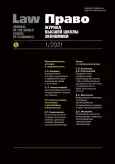Корпоративный контроль в российском и зарубежном праве: взаимосвязь права и экономики
- Авторы: Синицын С.1
-
Учреждения:
- Отдел гражданского законодательства и процесса Института законодательства и сравнительного правоведения при Правительстве Российской Федерации
- Выпуск: Том 14, № 1 (2021)
- Страницы: 4-36
- Раздел: Правовая мысль: история и современность
- URL: https://journals.rcsi.science/2072-8166/article/view/318092
- DOI: https://doi.org/10.17323/2072-8166.2021.1.4.36
- ID: 318092
Цитировать
Полный текст
Аннотация
Об авторах
Сергей Синицын
Отдел гражданского законодательства и процесса Института законодательства и сравнительного правоведения при Правительстве Российской Федерации
Email: noreply@hse.ru
Ведущий научный сотрудник, доктор юридических наук
Список литературы
- Bebchuk L., Kraakman R., Triantis G. (2000) Stock Pyramids, Cross-Ownership, and Dual Class Equity: The Mechanisms and Agency Costs of Separating Control from CashFlow Rights. University of Chicago Press, 318 p.
- Beyer J. (1999) Unternehmensverflechtungen und Managerherrschaft in Deutschland. Leviathan, vol. 27, no 4, pp. 518-536.
- Christoffersen S., Geczy C., Musto D., Reed A. (2007) Vote Trading and Information Aggregation. Journal of Finance, vol. 62, p. 2897-2929.
- Cioffi J-W., Höpner M. (2006) Das parteipolitische Paradox des Finanzmarktkapitalismus. Aktionärsorientierte Reformen in Deutschland, Frankreich, Italien und den USA. Politische Vierteljahresschrift, vol. 47, no 3 (September), pp. 419-440.
- Deborah A. (1999) The Mechanism of Control. Connecticut Journal of International Law, vol. 13, pp. 233-255.
- Dyachenko E.B. (2013) Control over corporations. Moscow: Infotropik Media, 144 p. (in Russian)
- Eichner M-P. (2010) Anschleichen bei Unternehmensübernahmen — Perfides taktisches Manöver oder achtbare strategische Entscheidung? Zeitschrift für Rechtspolitik, 43. Jahrg., S. 1-5.
- Einsele D. (2014) Kapitalmarktrecht und Privatrecht. Juristen Zeitung, no 14 (18. Juli), S. 703-714.
- Fama F. (1970) Efficient Capital Markets: A Review of Theory and Empirical Work. Journal of finance, vol. 25, p. 383-417.
- Fey G. (2000) Unternehmenskontrolle und Kapitalmarkt: Die Aktienrechtsreformen von 1965 und 1998 im Vergleich. Stuttgart: Gruyter, 83 S.
- Geibel S-J. (2008) Treuhandrecht als Gesellschaftsrecht. Tübingen: Mohr Siebeck, 523 S.
- Gierke O. (1913) Das deutsche Genossenschaftsrecht. Berlin: Weidmannsche Buchhandlung, Bd. 4, 567 S.
- Glushetsky A. (2013) Corporate control of participants of economic society and methods of its formation. Menedgment and biznes-administrirovanie, no 3, pp. 38-48 (in Russian)
- Gullifer L., Payne J. (2015) Corporate Finance Law: Principles und Policy. Oxford: University, 896 p.
- Gutnikov O.V. (2019) Corporate liability in civil law. Moscow: Norma, 488 p. (in Russian)
- Haar B. (2008) Law and Finance — Kapitalmarktentwicklung in interdisziplinärer Perspektive. Juristen Zeitung, no 20, pp. 964-974.
- Heindel T. (hsg.) (2020) Aktienrecht und Kapitalmarktrecht. Bonn: Nomos, 3293 S.
- Henry T., Bernard S. (2006) The New Vote Buying: Empty Voting and Hidden (Morphable) Ownership. Southern California Law Review, vol. 79, pp. 811-908.
- Hopt K., Kanda H., Rock E. (2009) The Anatomy of Corporate law. Oxford: University, 352 p.
- Houben E. (1998) Funktionsweise und effiziente Ausgestaltung des Marktes für Unternehmenskontrolle. Bonn: Diplomica Verlag, 66 S.
- Kaserer K. (2011) Mehr Aktionärsrechte und weniger Interessenskonflikte für eine verbesserte Corporate. Die Unternehmung, vol. 65, no 4, p. 320-327.
- Khachaturyan A. (2007) Trapped in Delusions: Democracy, Fairness and the One-Share-One-Vote Rule in the European Union. European Business Organization Law Review, vol. 8, pp. 335-367.
- Khlyustov P. V. (2013) Repo contract in Russian civil law. Candidate of Juridical Sciences Thesis. Moscow, 260 p. (in Russian)
- Kraakman R., Armour J., Davies P. et al. (2017) De kern van het ondernemingsrecht. Deventer: Wolters Kluwer, 278 p.
- Kulagin M.I. (1997) State monopolistic capitalism and legal person. Moscow: Statut, 329 p. (in Russian)
- Lavrov M.V. (2006) Risk in the sphere of corporate control. Candidate of Juridical Sciences Thesis. Volgograd, 200 p. (in Russian)
- Lohrer S. (2001) Unternehmenskontrolle und Übernahmerecht. Baden-Baden: Nomos, 320 S.
- Lomakin D.V. (2018) Control as a form of dependency of legal entities. Khozyaystvo i pravo, no 2, pp. 3-20 (in Russian)
- Lutz R. (2017) Der Gesellschafterstreit. München: C.H. Beck, 563 S.
- Manne H.G. (1965) Mergers and the Market for Corporate Control. Journal of Political Economy, vol. 73, p. 110-120.
- Mittermeier M. (2014) Empty Voting: Riskoentleerte Stimmrechtsausübung im Recht der börsennotierten Aktiengesellschaft. Hamburg: De Gruyter, 468 S.
- Moerland P. (1995) Corporate Ownership and Control Structures: An International Comparison. Review of Industrial Organization, pp. 443-464.
- Osipenko O.V. (2014) Corporate control: problems of managing subsidiaries. Moscow: Statut, 686 p. (in Russian)
- Reichert J., Weller M.-F. (2002) Haftung von Kontrollorganen: Die Reform der aktienrechtlichen und kapitalmarktrechtlichen Haftung. Zeitschrift für Rechtspolitik, 35. Jahrg., H. 2, S. 45-63.
- Ripert G. (1952) Les aspects juridiques du capitalisme moderne. Paris: LGDJ, 354 p.
- Robert C. (1979) Vote Buying und Corporate Law. Case Western Reserve Law Review, vol. 29, pp. 776-807.
- Sarbash S.V. (2008) The restoration of corporate control. Vestnik grazhdanskogo prava, no 4. pp. 70-79 (in Russian)
- Shen J. (2016) The Anatomy of Dual Class Share Structures: A Comparative Perspective. Hong Kong Law Journal, vol. 46, pp. 1-14.
- Stepanov D.I. (2009) The phenomenon of corporate control. Vestnik grazhdanskogo prava, no 3, pp. 142-206 (in Russian)
- Sukhanov E.A. (2013) Comparative corporate law. Moscow: Statut, 456 p. (in Russian)
- Tarasov I.T. (2000) The doctrine of joint-stock companies. Moscow: Statut, 666 p. (in Russian)
- Windolf P. (1994) Die neuen Eigentümer. Eine Analyse des Marktes für Unternehmenskontrolle. Zeitschrift für Soziologie, Jg. 23, Heft 2, S. 73-92.
- Zechner J. (1999) Institutions of Corporate Governance: Comment. Journal of Institutional and Theoretical Economics. Zeitschrift für die gesamte Staatswissenschaft, vol. 155, no 1, pp. 19-21.
- Zotova E.K. (2019) Corporate control in a company limited by shares in Germany and Russia. Candidate of Juridical Sciences Thesis. Moscow, 269 p. (in Russian)
Дополнительные файлы








